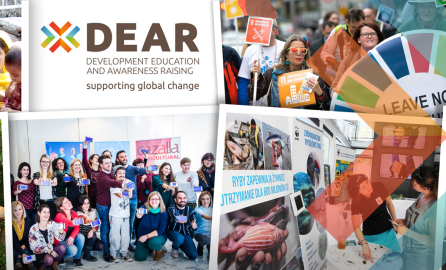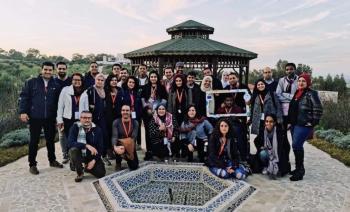The EU’s Development Education and Awareness Raising (DEAR) Programme funds projects across the European Union. The 10 latest projects were launched in July 2020. They focus primarily on empowering and engaging young people in actions for positive social change and global development. But how can activism and inspirational learning take place in lockdown?
Though part of DEVCO, DEAR projects take place inside European Union member states, engaging the European public in global development issues affecting the environment, as well as social and economic aspects of our society. By working with civil society groups and local authorities, DEAR promotes EU fundamental values such as freedom, democracy and the rule of law.
The DEAR Programme has its roots in the 1970s but has constantly evolved and changed to meet the needs of society and reflect European priorities. Recently, DEAR projects have focused on raising awareness and leading action on climate change, and on changing negative perceptions around migration – both issues that regularly appear in Eurobarometers surveys as of high concern to EU citizens.
This year, the International Youth Day’s theme was Youth Engagement for Global Action. The latest DEAR projects focus entirely on youth engagement, empowering Europe’s under 35-year olds to take action for positive change. Whether through enabling them to take part in campaigning and advocacy, or raising their awareness on global challenges through formal or non-formal learning.
In this video, David Flynn, DEVCO Programme Assistant, shares background information about the DEAR programme and why it is now focusing on youth.
But how can young people engage in global action when they can’t leave their homes? How can projects deliver on their campaigning and advocacy commitments in an era of social distancing? How can education projects inspire without real-world interaction?
Adaptation and flexibility
In May 2020, a special online seminar brought together ongoing DEAR projects to share their experiences on the impact of the COVID-19 pandemic. It focused on their day-to-day operations and shared valuable tips and lessons learned on how they are meeting their project goals within the confines of a global pandemic.
All projects that participated in that session, stressed the importance of adaptation and flexibility. Project leaders and the stakeholders they work with had to maintain open channels of communication. With planned face-to-face meetings off the table and COVID creating a whole new series of operational challenges, project coordinators found it essential to reach out to their teams more than ever – to listen to their concerns so that they could fully understand challenges and adapt to meet new needs. While technology offered great potential for plugging gaps left by cancelled events and gatherings, the disparity in tech skills forced many projects to set up their own IT helplines and ad hoc training events.
Across the board, DEAR projects reported a number of shared challenges, opportunities and risks:
Challenges
- Assessing what is worth doing online, and hence investing time, is problematic;
- Attention of European citizens who are the target audience for these projects is focused on the ongoing COVID-19 pandemic. This makes it more difficult to talk about projects’ priorities, such as migration and climate change, even if these issues have some links to the health crisis;
- Maintaining existing networks online or establishing new ones can be a challenge;
- Decision-makers are not available or difficult to contact – a particular challenge for projects working with local authorities;
Opportunities
- Developing online actions that highlight the need for economic recovery to include Sustainable Development Goals (SDG) criteria;
- Using media interest to draw attention to the projects’ priorities such as the effect of COVID on communities in the South and its interlinkage with inequalities or climate change.
Risks
- Longer-term planning, taking into account ‘a new normal’, is surrounded by uncertainties;
- Projects depending on face-to-face contacts may find it impossible to achieve their objectives. A global learning project in lockdown
In this video, Harm-Jan Fricke, DEAR Support Team Leader, discusses the concept of global citizenship, the importance of the DEAR programme and how projects are coping with the COVID-19 pandemic.
A global learning project in lockdown: The Get up and Goals project
The Get up and Goals project aims to support the implementation of the SDGs in schools across 12 European countries.
As Europe entered lockdown earlier this year, project organisers had to quickly look at ways to achieve their project goals within the new confines:
- Digital learning materials were quickly developed;
- The project team had to set up a telephone support system to help teachers and schools not so familiar or confident in taking online lessons;
- Students were also encouraged to participate in this new way of learning and were supported in developing an online game about migration issues;
- The project designed a manual on activism for students.
This video produced by the DEAR programme highlights the role of young people engaged in global action.
Full details of the COVID-19 Hub, an online seminar discussing innovative solutions to continue to meet project goals, can be found in the DEAR Programme page on Capacity4dev.
Austria, Bulgaria, Czech Republic, Hungary, Ireland, Italy, Netherlands, Poland, Portugal, Romania, Spain, and the United Kingdom.
Credit: Videos © Capacity4dev & DEAR Programme| Photo © DEAR programme





Log in with your EU Login account to post or comment on the platform.